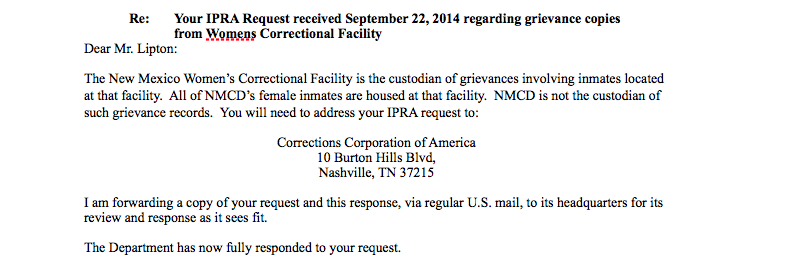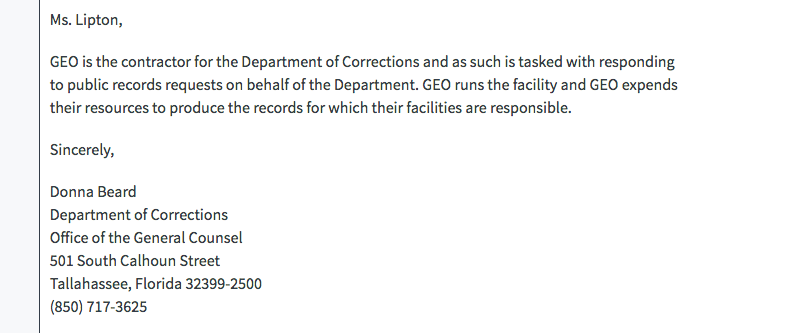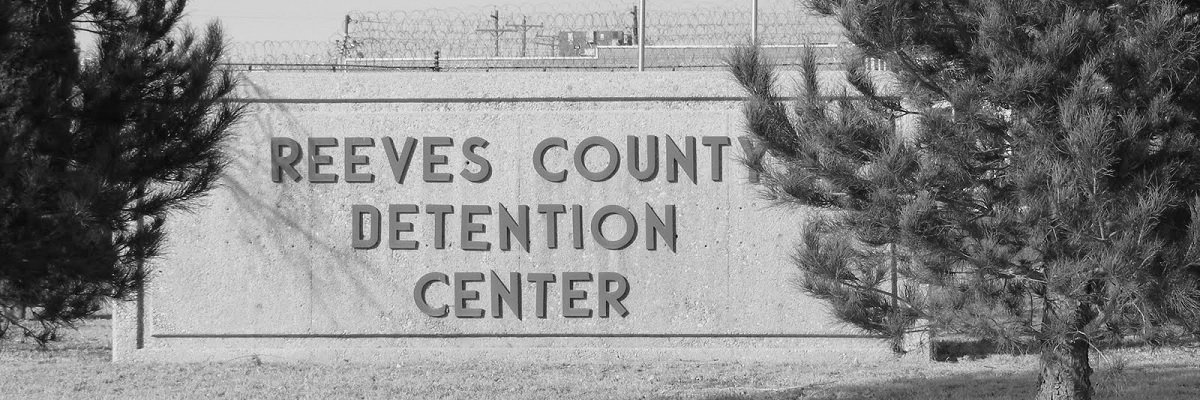I wrote out an unusual name in the “Pay To” field of a check this week.
“Struck Wieneke & Love,” the local law offices for Corrections Corporation of America. For a dollar a page, I can have access to grievances I initially requested in September 2014 from the New Mexico Department of Corrections. Back then, NM DOC directed me to deal with CCA. CCA runs the NM Women’s Correctional Facility. So CCA holds those records.

I hope that gave you occasion for pause. It certainly did me. If an inmate has a complaint in a private facility, that complaint goes to the operators of the facility - in this case, CCA. It does not go to CCA’s employer, the State. To get access to these grievances, I need to pay CCA, a company traded on the New York Stock Exchange. And so earlier this week I wrote them a check for $78.00 and sent it to Arizona.
This isn’t the first time I’ve encountered this seemingly standard chain of command. The first time was in Florida, where I was requesting the grievance records for GEO Group’s facilities.

I thought I’d cut the check, but in the pause before scrawling “GEO Group” on it, it seemed that there must be another way. No way do I have to sign my name on a check made out to the group I’m investigating for the records detailing their alleged misdeeds. The Department itself must keep them.

No, no. The Department itself does not keep them.
When the first sparks of the Private Prison Project were kindled in the summer of 2014, it was with a sort of hubristic enthusiasm. Familiar as I was with FOIA, with government, human systems generally - still, I thought that there would be a sort of consistency. Some straightforward paths would yield straightforward results. Private prisons aren’t subject to FOIA, but their bosses are. That should be the relevant point.
And yet it’s not. The prisons may not be subject to the laws, as we’ve seen in corporate response letters like the one above. They may not be subject to the reporting requirement, like with BJS Death in Custody reporting. They may require huge fees. They may just not keep that sort of thing, even if the contract says they do.
I guess, to the extent that we, the public, have thought about it, we always assumed they would. In this corner, I was encountering the sort of sinking disbelief that fogged up debate all year, that some have known about for a long time. The checks aren’t in use. The balances aren’t in place. The record just doesn’t seem to reflect reality.
At last count, over 131,000 people were being held in private facilities in the U.S. The Bureau of Prisons keeps 40,000, a fifth of their inmates, in private facilities; roughly 90,000 are held by different states. For 30 years, private prisons in America have been growing, and most people didn’t even know they exist. (I’ve yet to encounter the news received with pride, though that might be a bias of company).
Corrections Corporation - Red
GEO Group - Blue
Management and Training Corporation - Green
The infrastructure to keep it in place has been built on comparisons between public and private facilities done in the eighties and early nineties. Our policies from that time are being scrutinized now. Private prisons should be part of that discussion, if even only to show that their benefits to local economy, or compliance with the law, or seeming necessity are all justified talking points and lessons from which to learn.
Maybe, then, it’s with the same sort of “if you build it, they will come” mentality that MuckRock launched the Private Prison Project. There are plenty of people - lawyers, journalists, citizens - who possess a common confusion and need access to materials if it will be clarified. That widespread interest manifested itself this fall, when a hundred people threw their dollar bills where their beliefs are and contributed to our crowdfunding campaign. They’ll help jump the hurdles of fees and the vague denials that these requests are “in the public interest.”
As we enter 2016, MuckRock and a strong group of dedicated partners are exploring private prisons further. We’ll do our best to break the monolith of the private prison system into clear and useful bites. It’s an issue that affects a third of the United States, immigrants, and how public records should be kept to inform discussion.
Politicians and the public have turned their backs on private prison companies this year. The very thing that ushered in their favor - cost-savings - is now their heel. Bernie Sanders wants them gone. Hillary Clinton won’t take money from them. But, more importantly, it should be you, the individual, who is considering how money motivates our criminal justice system.
So if you feel any interest at all about knowing more about the private prison system, please let us know. Or if you’ve experienced it for yourself, absolutely let us know. Or sign up for our mailing list. You’ll receive the latest articles and updates on how you can contribute to the project; there will be ever more fees to conquer, but once they’re paid, they’ll be available for free for everyone. And, though, I may not feel comfortable with who the check is being made out to, at least you’ll know why.
Image via Shadowproof




